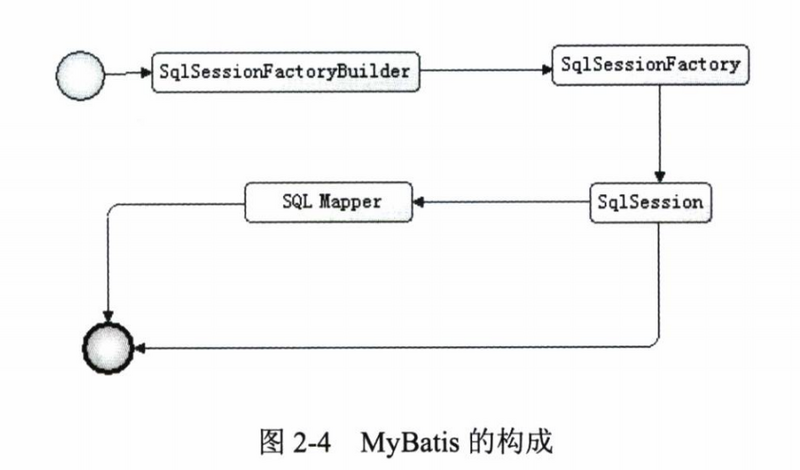Mybatis精讲(二)---生命周期
[TOC]
回顾
- 上一章节我们通过xml和代码的方式实现了Mybatis环境的配置。代码方式只是简单介绍下。我们也知道我们大部分情况使用的是xml方式的配置。在实际开发中我们那样开发显然是不合理的。
- 上章节提到的组件显示不可能每次执行sql都要重新创建的。这样性能上肯定是过不去的。今天我们就来简单聊聊SqlSessionFactoryBuilder、SqlSessionFactory、SqlSession、Mapper这些组件的生命周期吧。

SqlSessionFactoryBuilder
- 通过观察分析这个类我们就知道既然是Builder模式的类,那他的作用就是构建起(孵化器).换句话说这个类不是那么的重要,因为他唯一的作用就是孵化SqlSessionFactory。在Spring与Mybatis整合的框架中,我相信Spring一定是在构建了SqlSessionFactory之后就将这个类进行回收了。因为后面就不需要了。这里纯属个人猜想。
public SqlSessionFactory build(InputStream inputStream, String environment, Properties properties) {
try {
XMLConfigBuilder parser = new XMLConfigBuilder(inputStream, environment, properties);
return build(parser.parse());
} catch (Exception e) {
throw ExceptionFactory.wrapException("Error building SqlSession.", e);
} finally {
ErrorContext.instance().reset();
try {
inputStream.close();
} catch (IOException e) {
// Intentionally ignore. Prefer previous error.
}
}
}
- 上面就是我们通过加载xml配置文件的源码。我们不难发现build核心是通过XMLConfigBuilder这个类去负责解析mybatis-config.xml配置文件并生成Configuration对象。
SqlSessionFactory
DefaultSqlSessionFactory
openSessionFromDataSource
- SqlSessionFactory通过openSession方法获取SqlSession.SQLSession实际上可以看做是一次数据库的连接。下面我们通过源码的方式去看看工厂是如何生产SqlSession的。
<!--定义数据库信息,默认使用development数据库构建环境-->
<environments default="development">
<environment id="development">
<!--jdbc事物管理-->
<transactionManager type="JDBC"></transactionManager>
<!--配置数据库连接信息-->
<dataSource type="POOLED">
<property name="driver" value="${database.driver}"/>
<property name="url" value="${database.url}"/>
<property name="username" value="${database.username}"/>
<property name="password" value="${database.password}"/>
</dataSource>
</environment>
</environments>
private SqlSession openSessionFromDataSource(ExecutorType execType, TransactionIsolationLevel level, boolean autoCommit) {
//定义一个事物对象
Transaction tx = null;
try {
//通过配置对象获取事先配置好的环境对象 这里对应了xml中的environments标签 。environments默认develop.所以是develop的environment
final Environment environment = configuration.getEnvironment();
//通过环境获取事物。在environment里配置了JDBC类型的事物==JdbcTransactionFactory;如果没有配置则默认采用ManagedTransactionFactory
final TransactionFactory transactionFactory = getTransactionFactoryFromEnvironment(environment);
//构建事物对象 , 实际就是属性的赋值
tx = transactionFactory.newTransaction(environment.getDataSource(), level, autoCommit);
//获取执行器 BatchExecutor、ReuseExecutor、SimpleExecutor , 选择SimpleExecutor
//因为默认有缓存,这里会用CachingExecutor包裹原始Executor , 之后会加载各种插件
final Executor executor = configuration.newExecutor(tx, execType);
//返回DefaultSqlSession。写死
return new DefaultSqlSession(configuration, executor, autoCommit);
} catch (Exception e) {
closeTransaction(tx); // may have fetched a connection so lets call close()
throw ExceptionFactory.wrapException("Error opening session. Cause: " + e, e);
} finally {
ErrorContext.instance().reset();
}
}
Executor
- Mybatis的数据库执行器。Mybatis提供了一共四中Executor.这里严格意义上应该说是三种 BatchExecutor、ReuseExecutor、SimpleExecutor。还有一个CachingExecutor。这里为什么不把他算上了。因为这个是一个全局的开关。在settings标签的cacheEnabled设置的。说道这个标签大家都知道这个就是二级缓存的开关。所以这里CachingExecutor就不做介绍了。
- SimpleExecutor是一种常规执行器,每次执行都会创建一个statement,用完后关闭。
- ReuseExecutor是可重用执行器,将statement存入map中,操作map中的statement而不会重复创建statement。
- BatchExecutor是批处理型执行器,doUpdate预处理存储过程或批处理操作,doQuery提交并执行过程。
- 关于Executor的选取也是在settings标签控制的。defaultExecutorType。 默认是simple
SqlSession
- 每个线程都有一个属于自己的Sqlsession对象。这里我们看成是一次Connection。他的生命周期应该是一次完成的事物处理过程。他是一个线程不安全的对象。在多线程操作的时候我们需要注意事物的隔离级别。我们操作时需要注意的是每次处理玩需要将他关闭。否则会造成资源浪费。在Mybaits中已经通过finnally把我们将他释放了。
Mapper
- Mapper是一个接口,我们可以将xml看成他的一个实现类。这里的实现类虚化。通过Java代码的调用实际将xml对应的sql发送给数据库并获取数据结果。
public <T> T getMapper(Class<T> type, SqlSession sqlSession) {
final MapperProxyFactory<T> mapperProxyFactory = (MapperProxyFactory<T>) knownMappers.get(type);
if (mapperProxyFactory == null) {
throw new BindingException("Type " + type + " is not known to the MapperRegistry.");
}
try {
return mapperProxyFactory.newInstance(sqlSession);
} catch (Exception e) {
throw new BindingException("Error getting mapper instance. Cause: " + e, e);
}
}
- 通过上述代码我们能够发现。在获取Mapper的时候先通过类型看是否被注册了。然后根据类别获取代理实例。
总结
- 关于生命周期其实没什么重点。这一章节也比较简单。我们只需要知道我们最终需要的Mapper。然后是如何从配置到获取Mapper.这过程中哪些是全局的。哪些又适合做成复用的。
<span id="addMe">加入战队</span>
微信公众号

正文到此结束
- 本文标签: value src tab SqlSessionFactory map JDBC App final autocommit 数据库 executor NSA stream XML build 源码 SqlSessionFactoryBuilder sql session CTO 开发 Word cache 数据 缓存 实例 Connection update Action 安全 id 代码 mybatis 生命 https sqlsession UI Proxy parse java dataSource Property cat IO 多线程 插件 http db mapper 配置 Statement 解析 spring 总结 微信公众号 线程 二级缓存 管理
- 版权声明: 本文为互联网转载文章,出处已在文章中说明(部分除外)。如果侵权,请联系本站长删除,谢谢。
- 本文海报: 生成海报一 生成海报二
热门推荐
相关文章
Loading...











![[HBLOG]公众号](https://www.liuhaihua.cn/img/qrcode_gzh.jpg)

